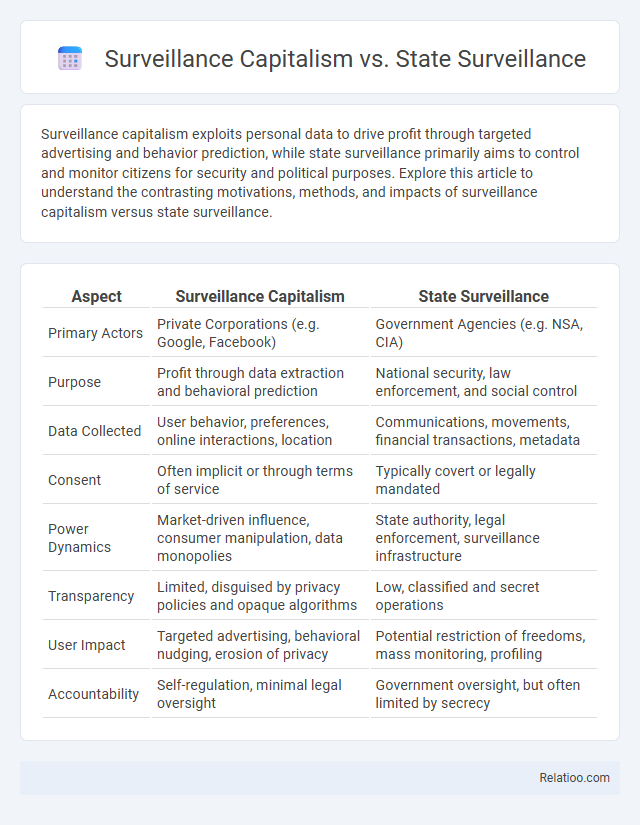Surveillance capitalism exploits personal data to drive profit through targeted advertising and behavior prediction, while state surveillance primarily aims to control and monitor citizens for security and political purposes. Explore this article to understand the contrasting motivations, methods, and impacts of surveillance capitalism versus state surveillance.
Table of Comparison
| Aspect | Surveillance Capitalism | State Surveillance |
|---|---|---|
| Primary Actors | Private Corporations (e.g. Google, Facebook) | Government Agencies (e.g. NSA, CIA) |
| Purpose | Profit through data extraction and behavioral prediction | National security, law enforcement, and social control |
| Data Collected | User behavior, preferences, online interactions, location | Communications, movements, financial transactions, metadata |
| Consent | Often implicit or through terms of service | Typically covert or legally mandated |
| Power Dynamics | Market-driven influence, consumer manipulation, data monopolies | State authority, legal enforcement, surveillance infrastructure |
| Transparency | Limited, disguised by privacy policies and opaque algorithms | Low, classified and secret operations |
| User Impact | Targeted advertising, behavioral nudging, erosion of privacy | Potential restriction of freedoms, mass monitoring, profiling |
| Accountability | Self-regulation, minimal legal oversight | Government oversight, but often limited by secrecy |
Understanding Surveillance Capitalism
Surveillance capitalism refers to the commodification of personal data by corporations to predict and influence consumer behavior, distinguishing itself from state surveillance, which primarily aims at social control and national security. This business model exploits your online activities, leveraging algorithms and artificial intelligence to generate targeted advertisements and behavioral predictions. Understanding surveillance capitalism is essential to recognize how your digital footprint is monetized and to develop strategies for protecting your privacy in an increasingly data-driven economy.
State Surveillance: An Overview
State surveillance involves government monitoring and data collection of citizens' activities through advanced technologies like facial recognition, internet tracking, and mass communication interception. Unlike surveillance capitalism, which exploits personal data for profit by private companies, state surveillance prioritizes national security, law enforcement, and social control objectives. Your privacy rights and digital freedoms face significant challenges under pervasive state surveillance systems due to their extensive scale and authority.
Key Differences Between Corporate and State Surveillance
Surveillance capitalism leverages user data primarily for profit through targeted advertising and behavior prediction, whereas state surveillance focuses on national security, law enforcement, and population control. Corporate surveillance operates within a market-driven framework exploiting personal data for economic gain, while state surveillance utilizes legal and political authority to monitor and regulate citizens. Understanding these distinctions helps you recognize how your data may be used differently by private companies versus government entities.
Motivations: Profit vs. Power
Surveillance capitalism prioritizes data extraction to maximize profits by analyzing user behavior for targeted advertising and product development. State surveillance focuses on consolidating power, maintaining control, and ensuring national security through monitoring citizen activities. Your awareness of these differing motivations helps distinguish profit-driven corporate practices from government-led authority enforcement.
Data Collection Methods Compared
Surveillance capitalism primarily collects data through online activities, including social media monitoring, search queries, and targeted advertising algorithms, leveraging user behavior for profit-driven insights. State surveillance employs extensive methods such as mass data interception, facial recognition technology, location tracking via government databases, and cooperation with telecom providers for comprehensive monitoring. Surveillance overall encompasses both commercial and governmental techniques, combining passive data harvesting with active surveillance tools like CCTV cameras, biometric systems, and metadata analysis to gather, analyze, and utilize personal information.
Impact on Privacy and Civil Liberties
Surveillance capitalism exploits personal data for profit, significantly eroding privacy by commodifying user behavior and undermining informed consent, while state surveillance prioritizes national security but often infringes on civil liberties through mass data collection without transparent oversight. Both practices weaponize surveillance technologies, leading to chilling effects on free speech, associations, and fostering environments of mistrust. The pervasive monitoring risks normalizing privacy violations, requiring robust legal frameworks to balance security, economic interests, and fundamental human rights.
The Role of Big Tech in Mass Surveillance
Big Tech companies play a central role in mass surveillance by collecting vast amounts of user data to fuel surveillance capitalism, where personal information is monetized through targeted advertising and behavior prediction. This corporate-driven data extraction often intersects with state surveillance, as governments leverage Big Tech's infrastructure and data access for intelligence and law enforcement purposes, raising concerns about privacy erosion and democratic accountability. The convergence of corporate and state interests in surveillance technologies intensifies debates over data ownership, consent, and the ethical implications of pervasive monitoring.
Legal and Ethical Implications
Surveillance capitalism exploits personal data for profit, often bypassing informed consent and raising significant privacy concerns under data protection laws like GDPR and CCPA. State surveillance, justified by national security and law enforcement, faces legal scrutiny regarding civil liberties and potential abuses under constitutional protections and international human rights standards. Your privacy rights confront ethical dilemmas as surveillance blurs boundaries between commercial exploitation and government monitoring, demanding robust legal frameworks and transparent accountability.
Resistance and Public Response
Resistance to surveillance capitalism, state surveillance, and general surveillance manifests through grassroots activism, legal challenges, and privacy-focused technologies aiming to protect your digital rights. Public responses often include widespread demand for transparency, data protection laws like GDPR, and the adoption of encryption tools to counter unauthorized data exploitation. Civic engagement plays a crucial role in shaping policies that balance security needs with individual privacy in an increasingly monitored society.
Future Trends in Surveillance Practices
Future trends in surveillance practices reveal a complex interplay between surveillance capitalism, state surveillance, and general surveillance technologies, driven by advancements in AI, big data analytics, and IoT integration. Surveillance capitalism leverages personalized data harvesting to optimize targeted advertising and behavioral predictions, while state surveillance increasingly employs sophisticated facial recognition, biometric tracking, and mass data collection for national security and social control. Emerging privacy regulations and ethical frameworks seek to balance innovation with civil liberties, influencing how corporations and governments deploy surveillance tools in the coming decade.

Infographic: Surveillance Capitalism vs State Surveillance
 relatioo.com
relatioo.com